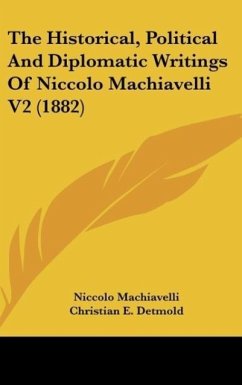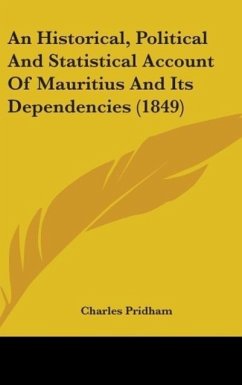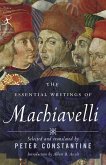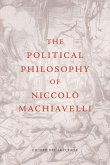Niccolo Machiavelli
The Historical, Political And Diplomatic Writings Of Niccolo Machiavelli V2 (1882)
Herausgeber: Detmold, Christian E.
Niccolo Machiavelli
The Historical, Political And Diplomatic Writings Of Niccolo Machiavelli V2 (1882)
Herausgeber: Detmold, Christian E.
- Gebundenes Buch
- Merkliste
- Auf die Merkliste
- Bewerten Bewerten
- Teilen
- Produkt teilen
- Produkterinnerung
- Produkterinnerung
In Four Volumes.
Andere Kunden interessierten sich auch für
![Wilson's Historical, Traditionary, And Imaginative Tales Of The Borders V2 Wilson's Historical, Traditionary, And Imaginative Tales Of The Borders V2]() John Mackay WilsonWilson's Historical, Traditionary, And Imaginative Tales Of The Borders V250,99 €
John Mackay WilsonWilson's Historical, Traditionary, And Imaginative Tales Of The Borders V250,99 €![The Diplomatic And Official Papers Of Daniel Webster, While Secretary Of State (1848) The Diplomatic And Official Papers Of Daniel Webster, While Secretary Of State (1848)]() Daniel WebsterThe Diplomatic And Official Papers Of Daniel Webster, While Secretary Of State (1848)40,99 €
Daniel WebsterThe Diplomatic And Official Papers Of Daniel Webster, While Secretary Of State (1848)40,99 €![Reminiscences Of Court And Diplomatic Life V2 Reminiscences Of Court And Diplomatic Life V2]() Georgiana Baroness BloomfieldReminiscences Of Court And Diplomatic Life V243,99 €
Georgiana Baroness BloomfieldReminiscences Of Court And Diplomatic Life V243,99 €![The Diplomatic Correspondence Of The American Revolution V10 (1829) The Diplomatic Correspondence Of The American Revolution V10 (1829)]() The Diplomatic Correspondence Of The American Revolution V10 (1829)51,99 €
The Diplomatic Correspondence Of The American Revolution V10 (1829)51,99 €![An Historical, Political And Statistical Account Of Mauritius And Its Dependencies (1849) An Historical, Political And Statistical Account Of Mauritius And Its Dependencies (1849)]() Charles PridhamAn Historical, Political And Statistical Account Of Mauritius And Its Dependencies (1849)48,99 €
Charles PridhamAn Historical, Political And Statistical Account Of Mauritius And Its Dependencies (1849)48,99 €![The Essential Writings of Machiavelli The Essential Writings of Machiavelli]() Niccolo MachiavelliThe Essential Writings of Machiavelli18,99 €
Niccolo MachiavelliThe Essential Writings of Machiavelli18,99 €![The Political Philosophy of Niccolò Machiavelli The Political Philosophy of Niccolò Machiavelli]() Filippo Del LuccheseThe Political Philosophy of Niccolò Machiavelli35,99 €
Filippo Del LuccheseThe Political Philosophy of Niccolò Machiavelli35,99 €-
-
-
In Four Volumes.
Hinweis: Dieser Artikel kann nur an eine deutsche Lieferadresse ausgeliefert werden.
Hinweis: Dieser Artikel kann nur an eine deutsche Lieferadresse ausgeliefert werden.
Produktdetails
- Produktdetails
- Verlag: Kessinger Publishing, LLC
- Seitenzahl: 472
- Erscheinungstermin: 2. Juni 2008
- Englisch
- Abmessung: 235mm x 157mm x 32mm
- Gewicht: 911g
- ISBN-13: 9781436543163
- ISBN-10: 1436543169
- Artikelnr.: 24679202
- Herstellerkennzeichnung
- Libri GmbH
- Europaallee 1
- 36244 Bad Hersfeld
- gpsr@libri.de
- Verlag: Kessinger Publishing, LLC
- Seitenzahl: 472
- Erscheinungstermin: 2. Juni 2008
- Englisch
- Abmessung: 235mm x 157mm x 32mm
- Gewicht: 911g
- ISBN-13: 9781436543163
- ISBN-10: 1436543169
- Artikelnr.: 24679202
- Herstellerkennzeichnung
- Libri GmbH
- Europaallee 1
- 36244 Bad Hersfeld
- gpsr@libri.de
Niccolò di Bernardo dei Machiavelli ( 3 May 1469 - 21 June 1527) was an Italian Renaissance diplomat, philosopher and writer, best known for The Prince (Il Principe), written in 1513. He has often been called the father of modern political philosophy or political science. For many years he served as a senior official in the Florentine Republic with responsibilities in diplomatic and military affairs. He wrote comedies, carnival songs, and poetry. His personal correspondence is of high importance to historians and scholars. He worked as secretary to the Second Chancery of the Republic of Florence from 1498 to 1512, when the Medici were out of power. Machiavelli's name came to evoke unscrupulous politicians of the sort Machiavelli advised most famously in The Prince.[7] Machiavelli considered political battles, not through a lens of morality, but as though they are a board game with established rules. His experience showed him that politics has always been played with deception, treachery and crime.[8] He also notably said that a ruler who is establishing a kingdom or a republic, and is criticized for his deeds, including violence, should be excused when the intention and the result is beneficial.[9][10][11] Machiavelli's Prince was much read as a manuscript long before it was published in 1532. The reaction was mixed: Some considered it a straightforward description of "the evil means used by bad rulers; others read in it evil recommendations to tyrants to help them maintain their power."[12] The term Machiavellian often connotes political deceit, deviousness, and realpolitik. Even though Machiavelli has become most famous for his work on principalities, scholars also give attention to the exhortations in his other works of political philosophy. While much less well known than The Prince, the Discourses on Livy (composed c.¿1517) is often said to have paved the way of modern republicanism








